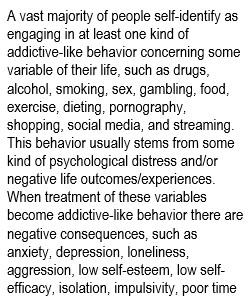A vast majority of people self-identify as engaging in at least one kind of addictive-like behavior concerning some variable of their life, such as drugs, alcohol, smoking, sex, gambling, food, exercise, dieting, pornography, shopping, social media, and streaming. This behavior usually stems from some kind of psychological distress and/or negative life outcomes/experiences. When treatment of these variables become addictive-like behavior there are negative consequences, such as anxiety, depression, loneliness, aggression, low self-esteem, low self-efficacy, isolation, impulsivity, poor time management, and physical and emotional withdrawal. Strong social support and positive subjective well-being can have a mitigating and/or preventive effect on one’s addictive-like behavior, however when behavior toward a problematic variable becomes addictive-like most people choose self-concealment of that behavior from the people around them, fueling dependence on the variable. Additionally, one may surround themselves or unintentionally be surrounded by people that engage in the same addictive-like behavior, thus encouraging each other, explicitly or implicitly, to continue the behavior unchecked.


